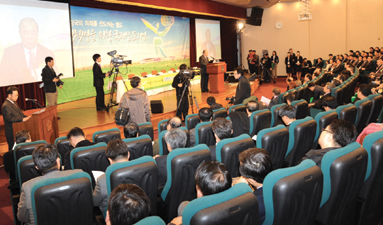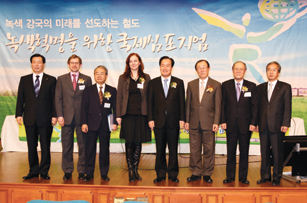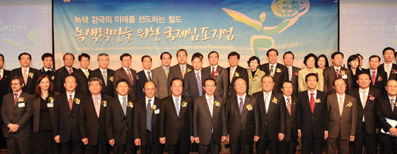Railways: Green, Energy-Efficient Means of Transportation
An international symposium was held in Seoul to celebrate the launch of 'Railway 100 People Forum'



Jean Faussurier, head of the Strategic Affairs Department at RFF, said, "At this current time of economic uncertainty, railway networks are considered to be a great long-term value, and in particular, railways may serve as the best transportation means contributing to a green revolution." He told an international symposium held at the National Assembly Library on Feb. 11 that railroads are an energy-efficient, comprehensive type of transportation means. Citing the fact that countries around the world are scrambling to expand investments in the railway sector in order to secure green growth, he called for the holding of public hearings and symposiums to enhance public acceptance toward railroads as a means of transportation.
France is sparing no efforts in investing in the modernization of its railway network with the goal of having 2,000 km. of new lines open by 2020, and this past November the French government promised the railway infrastructure authority, RFF, that it would finance 14 billion euro for the renovation of the railway infrastructure. He was one of the six speakers who made presentations at the symposium organized by the National Assembly and the Ministry of Land, Transport and Maritime Affairs (MLTM). The symposium, held under the theme "Sustainable Development and Development of the Eurasia Railroad in an Era of Green Growth," was designed to celebrate the launch of the tentatively named "Railway 100 People Forum." The speakers included He Huawu, the Chinese Railway Ministry's chief engineer, Suga Tatsuhiko, director of the Transportation Museum of Japan, and Margrethe Sagevik, senior sustainable development adviser of the International Union of Railways (UIC).
Sagevik said, "The low carbon advantage of the railways offers society as a whole an essential contribution on how to reduce the emissions from transportation if supported by appropriate measures. Rail transportation causes less than 1 percent of these emissions and they are still working hard to improve this performance even further by targeting all aspects of its energy activities ¡ª from the energy source and production to the end consumption, including design and procurement of new rolling stocks." "Policies must be implemented in order for society to fully benefit from the emission reduction potential of rail ¡ª using railways and their environmental advantages as the backbone. It is time for all stakeholders and transport and planning decision makers to take action. Railways offer a sustainable mobility solution through an efficient transport system built on social equality, low environmental impact and positive economic growth."
Among the approximately 400 people on hand at the symposium were National Assembly Speaker Kim Hyung-o, and Lee Byun-suk, chairman of the National Assembly Land, Transport and Maritime Affairs Committee, and one of the organizers of the symposium and the symposium.
Chairman Lee said in a speech, "Railways are an essential part of 'green land' and at the heart of the environmental revolution for low carbon, green growth." In suggesting the direction and vision of the development of the Korean railways, he said, railways serve as the lowest costing welfare benefit to which the public is entitled and the optimum transportation means designed to protect the underprivileged.
MLTM Minister Chung Jong-hwan said in his welcoming message, "With the commercialization of such alternative power-driven energies as electricity and magnetic levitation, railways are highlighted as an essential transportation means of the future and the development of environmentally-friendly railways emerges as an alternative solution for building up a low-carbon, green growth network." He said this event was expected to provide momentum for the public to reach a consensus on railways and the need for boosting investments in the sector, and his government will consider a plan to develop the Eurasian railway network in order to secure a stable land transportation network extending from the Korean Peninsula to Europe via China and Russia.
Advanced countries in the transportation sector have boosted investments in the railways, whose transportation portion accounts for more than 80 percent. On the other hand, Korea's investment in railways is almost half of its expenditures into expanding road infrastructure.
Speaking in environmentally-friendly terms, roads take up 75 percent of the Korean transportation sector's energy consumption, compared to railways' 1.7 percent share. Roads account for 78 percent of total greenhouse gas emissions by transportation means, while railways account for a mere 1 percent. nw
Foreign and Korean scholars and railways business people gather at a symposium held at the National Assembly on Feb. 11 in celebration of the launch of the tentatively-named "100 People's Declaration on Railways Forum. Dignitaries including foreign scholars pose for a photo session , Rep. Lee Byung-suk, 4th R, among them." The participants of the symposium include National Assembly Speaker Kim Hyung-o,; Lee Byung-suk, chairman of the National Assembly Land, Transport and Maritime Affairs Committee,; MLTM Minister Chung Jong-hwan, KORAIL Acting President Shim Heok-yoon,;Korea Rail Network Authority Chairman Cho Hyun-yong,; and other dignitaries.
3Fl, 292-47, Shindang 6-dong, Chung-gu, Seoul, Korea 100-456
Tel : 82-2-2235-6114 / Fax : 82-2-2235-0799